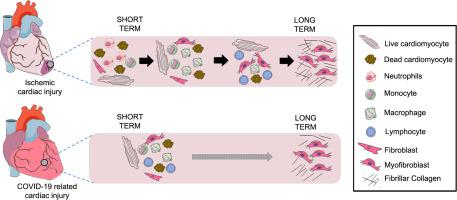Our official English website, www.x-mol.net, welcomes your
feedback! (Note: you will need to create a separate account there.)
Cardiac inflammation in COVID-19: Lessons from heart failure
Life Sciences ( IF 5.2 ) Pub Date : 2020-09-21 , DOI: 10.1016/j.lfs.2020.118482 Sathya D Unudurthi 1 , Priya Luthra 2 , Rajendran J C Bose 1 , Jason R McCarthy 1 , Maria Irene Kontaridis 3
Life Sciences ( IF 5.2 ) Pub Date : 2020-09-21 , DOI: 10.1016/j.lfs.2020.118482 Sathya D Unudurthi 1 , Priya Luthra 2 , Rajendran J C Bose 1 , Jason R McCarthy 1 , Maria Irene Kontaridis 3
Affiliation

|
Cardiovascular disease (CVD) is the most common co-morbidity associated with COVID-19 and the fatality rate in COVID-19 patients with CVD is higher compared to other comorbidities, such as hypertension and diabetes. Preliminary data suggest that COVID-19 may also cause or worsen cardiac injury in infected patients through multiple mechanisms such as ‘cytokine storm’, endotheliosis, thrombosis, lymphocytopenia etc. Autopsies of COVID-19 patients reveal an infiltration of inflammatory mononuclear cells in the myocardium, confirming the role of the immune system in mediating cardiovascular damage in response to COVID-19 infection and also suggesting potential causal mechanisms for the development of new cardiac pathologies and/or exacerbation of underlying CVDs in infected patients. In this review, we discuss the potential underlying molecular mechanisms that drive COVID-19-mediated cardiac damage, as well as the short term and expected long-term cardiovascular ramifications of COVID-19 infection in patients.
中文翻译:

COVID-19 中的心脏炎症:心力衰竭的教训
心血管疾病 (CVD) 是与 COVID-19 相关的最常见的合并症,与高血压和糖尿病等其他合并症相比,患有 CVD 的 COVID-19 患者的死亡率更高。初步数据表明,COVID-19 还可能通过“细胞因子风暴”、内皮增生、血栓形成、淋巴细胞减少等多种机制,导致或加重感染患者的心脏损伤。对 COVID-19 患者的尸检显示,心肌中有炎性单核细胞浸润。 ,证实了免疫系统在介导应对 COVID-19 感染的心血管损伤中的作用,并提出了感染患者出现新的心脏病和/或潜在 CVD 恶化的潜在因果机制。在这篇综述中,我们讨论了导致 COVID-19 介导的心脏损伤的潜在分子机制,以及 COVID-19 感染对患者的短期和预期的长期心血管影响。
更新日期:2020-09-21
中文翻译:

COVID-19 中的心脏炎症:心力衰竭的教训
心血管疾病 (CVD) 是与 COVID-19 相关的最常见的合并症,与高血压和糖尿病等其他合并症相比,患有 CVD 的 COVID-19 患者的死亡率更高。初步数据表明,COVID-19 还可能通过“细胞因子风暴”、内皮增生、血栓形成、淋巴细胞减少等多种机制,导致或加重感染患者的心脏损伤。对 COVID-19 患者的尸检显示,心肌中有炎性单核细胞浸润。 ,证实了免疫系统在介导应对 COVID-19 感染的心血管损伤中的作用,并提出了感染患者出现新的心脏病和/或潜在 CVD 恶化的潜在因果机制。在这篇综述中,我们讨论了导致 COVID-19 介导的心脏损伤的潜在分子机制,以及 COVID-19 感染对患者的短期和预期的长期心血管影响。











































 京公网安备 11010802027423号
京公网安备 11010802027423号